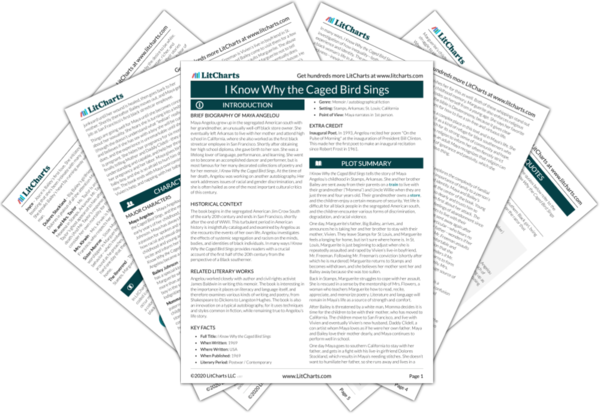The memoir also explores the idea of home and the pain and confusion of displacement, and in doing so for the particular experience of Maya Angelou also more broadly portrays these issues with respect to the history and experience of black Americans.
Marguerite is sent away from her mother and father to live with her grandmother at a young age; one of her earliest memories is of displacement, of being sent away from her home. She and Bailey often wonder why they were sent away—they feel rejected. At the same time, Marguerite associates Momma with home, and is sad to leave Arkansas when she and her brother go to St. Louis. In many ways, Marguerite’s childhood is characterized by an enduring struggle to identify “home.”
When Marguerite and Bailey are moved from Arkansas to California, Marguerite finds the transition painful, but understands it. Bailey is threatened by a white man who forces Bailey to help carry the carcass of a drowned black man found in the lake. After this incident occurs, Momma makes it clear that the children will have to move. In this way, displacement is shown to be a fundamental part of growing up black in America. Though Arkansas is Bailey’s home, he is forced to leave because violent racism drives him away.
In a book so deeply concerned with history, and with the history of black oppression, it is appropriate that displacement and the difficulty of finding “home” play a huge role in the lives of the book’s characters. The legacy of slavery is still having a palpable effect on the lives of Maya and her family—finding “home” in America proves to be especially difficult.
Home and Displacement ThemeTracker

Home and Displacement Quotes in I Know Why the Caged Bird Sings
If growing up is painful for the Southern Black girl, being aware of her displacement is the rust on the razor that threatens the throat.
It seemed that the peace of day’s ending was an assurance that the covenant God made with children, Negroes, and the crippled was still in effect.
When I was described by our playmates as being shit color, he was lauded for his velvet-black skin…And yet he loved me.
Momma intended to teach Bailey and me to use the paths of life she and her generation and all the Negroes gone before had found, and found to be safe ones.
He held me so softly I wished he wouldn’t ever let me go. I felt at home.
It would be safe to say that she made me proud to be a Negro, just by being herself.
The Black woman in the south who raises sons, grandsons, and nephews had her heartstrings tied to a hanging noose.
“It looks like Joe Louis is going down.” My race groaned. It was our people falling. It was another lynching, yet another Black man hanging on a tree. One more woman ambushed and raped. A Black boy whipped and maimed. It was hounds on the trail of a man running through the slimy swamps. It was a white woman slapping her maid for being forgetful.
It wouldn’t do for a Black man and his family to be caught on a lonely country road on a night when Joe Louis has proved that we were the strongest people in the world.
We were on top again. As always, again. We survived. The depths had been icy and dark, but now a bright sun spoke to our souls.
I wouldn’t miss Mrs. Flowers, for she had given me her secret world which called forth a djinn who was to serve me all my life: books.
The Japanese were not whitefolks…since they didn’t have to be feared, neither did they have to be considered.
Miss Kirwin never seemed to notice that I was Black and therefore different.
The fact that the adult American Negro female emerges a formidable character is often met with amazement, distaste, and even belligerence. It is seldom accepted as an inevitable outcome of the struggle won by survivors and deserves respect if not enthusiastic acceptance.
I patted my son’s body lightly and went back to sleep.
















